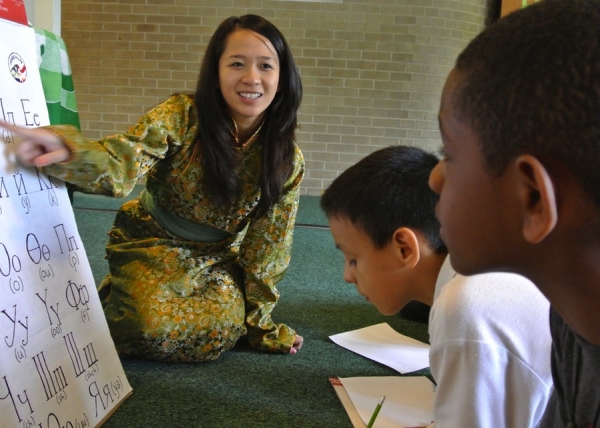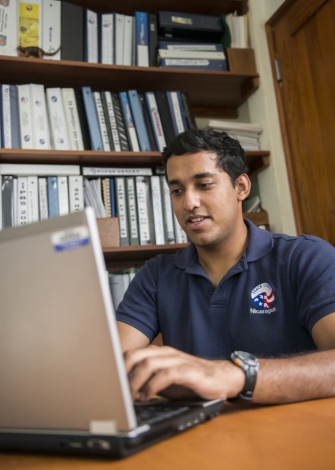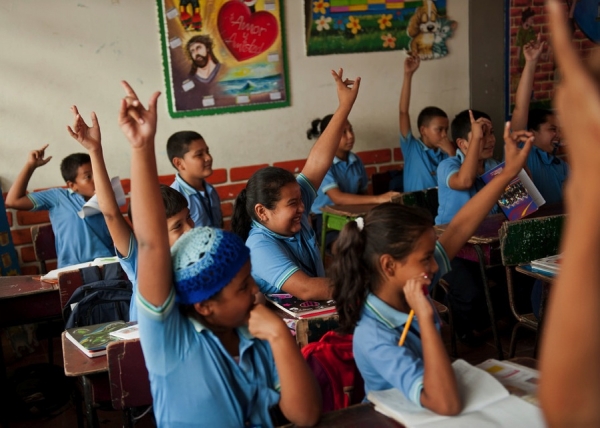Don't miss out on the best jobs!
Subscribe to HelpGoAbroad and weekly we will sent you an email with latest job posts. Provide your email address below
Deciding to volunteer overseas with the United States Peace Corps is a life-altering choice. Peace Corps Volunteers (PCVs) live and work within a community for up to 27 months. The decision to serve for over two years volunteering overseas is not a small one to make. Ready to apply?
HOW PEACE CORPS’ APPLICATION PROCESS WORKS
From the time an application is submitted to when a successful candidate is invited to serve usually takes about one year. Plan ahead and apply far in advance of availability.
After submitting an application, if an applicant meets the minimum requirements, he or she will be contacted by a regional recruiter to have an interview. If the interview goes well, a recruiter will likely nominate him or her for service.
A nominee usually corresponds directly with staff at Peace Corps’ headquarters following nomination. Upon medical and legal clearance, a placement officer ultimately extends an invitation to serve if a candidate is deemed suitable based on factors such as current openings and competitiveness.
TIPS TO BECOME A MORE COMPETITVE PEACE CORPS APPLICANT
Applying to volunteer with the Peace Corps is a competitive process. Peace Corps receives many applications each year, and while thousands of volunteers are placed in the field, not all applicants are suitable or competitive for service. There are several ways to become a more competitive applicant.
1. Be flexible on location and assignment.
Applicants are encouraged to express an area and/or country of particular interest when applying. However, be willing to go anywhere and do anything. Peace Corps places volunteers based on a blend of skillset and a country’s specific needs.
If an applicant is not open to serving anywhere, regardless of personal preference, it could be considered a red flag for what is to come. Working in emerging countries requires PCVs to be adaptable.
Flexibility essay help placement staff find the best matches for a candidates. The more flexible an applicant is about location and assignment, the easier he or she is to place.
2. Gain volunteer and leadership experience.
A commitment to service is a core component of being a competitive Peace Corps applicant. What better way to do demonstrate this dedication than to gain volunteer experience before applying, and throughout the application process?
Peace Corps wants applicants with strong leadership and community service skills. The more knowledge a candidate has in specific volunteer assignment areas, the more competitive his or her application will be.
Serving in a leadership capacity within a community or school, or tutoring English on the weekends are a few ways applicants can acquire the necessary volunteer experience to be more competitive.
3. Have a college degree and/or relevant work experience.
It is best to have a bachelor’s degree (or be working toward achieving it) before applying to serve with Peace Corps. Most volunteer positions require it.
Applicants with a two-year degree, and 3-5 years of relevant work experience in areas such as: agriculture, business, environment, health, information technology, and youth development are still considered apt for select positions.
4. Get rid of debt.
The monthly stipend PCVs receive is meant to cover living expenses in a country of service, and would not be sufficient to pay off previously accumulated debt. Applicants with outstanding debt must be able to prove how bills would be paid during service.
Many student loans can be deferred for up to 36 months, but car payments, credit cards, and mortgages cannot. Paying debt off or down is essential before receiving an invitation to volunteer, unless enough savings or another source of income would be accessible.
5. Demonstrate cultural appropriateness.
Ever lived abroad? Traveled? Know what it is like being the minority? These are a few areas to expand upon when applying and interviewing for a PCV position. Applicants should demonstrate cultural appropriateness by using socially acceptable language, and give examples of diverse living and/or working conditions they may have experienced.
6. Dress and correspond professionally.
Although it may seem like serving with Peace Corps means volunteers can wear whatever they want, especially if they are living on some remote island, keep in mind applying to serve with Peace Corps is essentially like applying to work for the U.S. government. Treat it as such from start to finish.
Dress professionally for the interview. Present a good example of personal capabilities. Correspondence with Peace Corps staff should also be professional.
7. Be prompt with application tasks.
Placing applicants from the point of nomination to invitation is not a small task. Just like countries volunteers serve in, Peace Corps has to work within an ever-changing and evolving environment. Promptly submitting materials shows enthusiasm, and following through with requests from Peace Corps staff helps move the process along.
8. Strengthen foreign language skills.
Knowing a second language is not necessary for all PCV positions; however, some regions require volunteers to know Spanish or French. To be competitive for these areas, candidates should have at least two university semesters, and/or four years of a romance language in high school. Applicants are encouraged to strengthen their foreign language skills during the application process as well.
9. Be in good health.
Service with Peace Corps can be physically, emotionally, and mentally demanding. Health exams before, during, and after service are mandatory. Be in good health, and ensure medical records are up to date. Having certain health issues could restrict where Peace Corps is able to place an applicant, possibly making him or her unsuitable for service.
10. Be okay with being a “general applicant”.
The term “general applicant” is often used behind the scenes of the application process to describe candidates who do not necessarily fit into a certain sector, but are strong nominees for service. It is a good thing.
Many applicants who fall into this category might be assigned to do something they were not originally nominated to do, and sooner or later than expected. Be okay with this. It is all part of the journey.
HARD WORK PAYS OFF
Two years is a huge commitment to make, and service with Peace Corps is not right for everyone. Peace Corps’ application process is rigorous for a reason. It prepares applicants for what actual service might be like. There are loads of unknown, heaps of changes, and the need for candidates to be flexible.
Not only is making it through to the point of invitation a huge accomplishment, but the best is yet to come. Hard work pays off. An incredible, life-changing adventure awaits successful candidates.
To be eligible for Peace Corps service, applicants must be at least 18 years of age and from the United States. Not a U.S. citizen? Look for similar organizations supporting long-term volunteer work abroad like Voluntary Service Overseas (VSO).
The contents of this article are the author’s opinions, and do not necessarily reflect any position of the U.S. Government or the U.S. Peace Corps.
Sign in to publish a comment




Be the first to comment on this post.